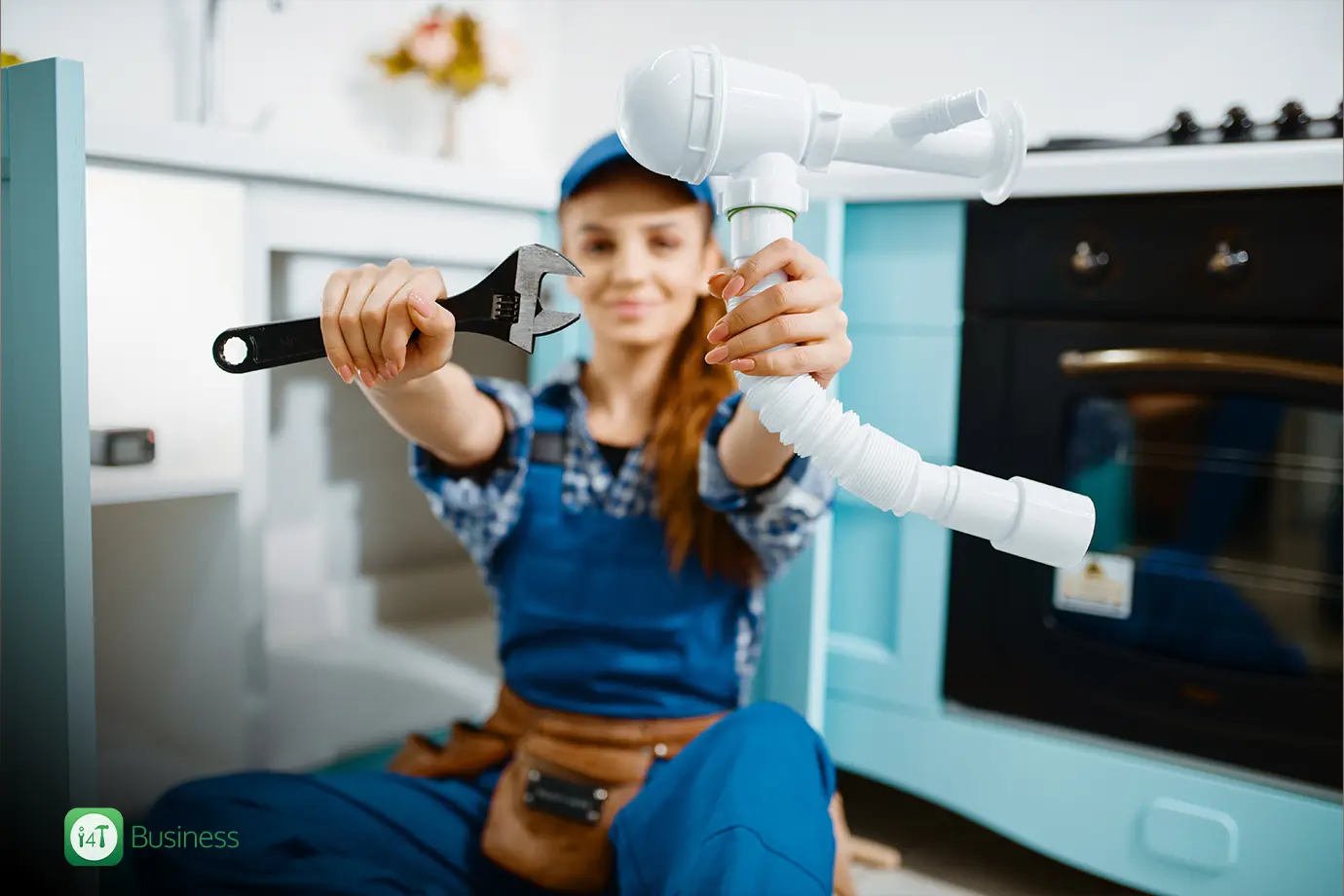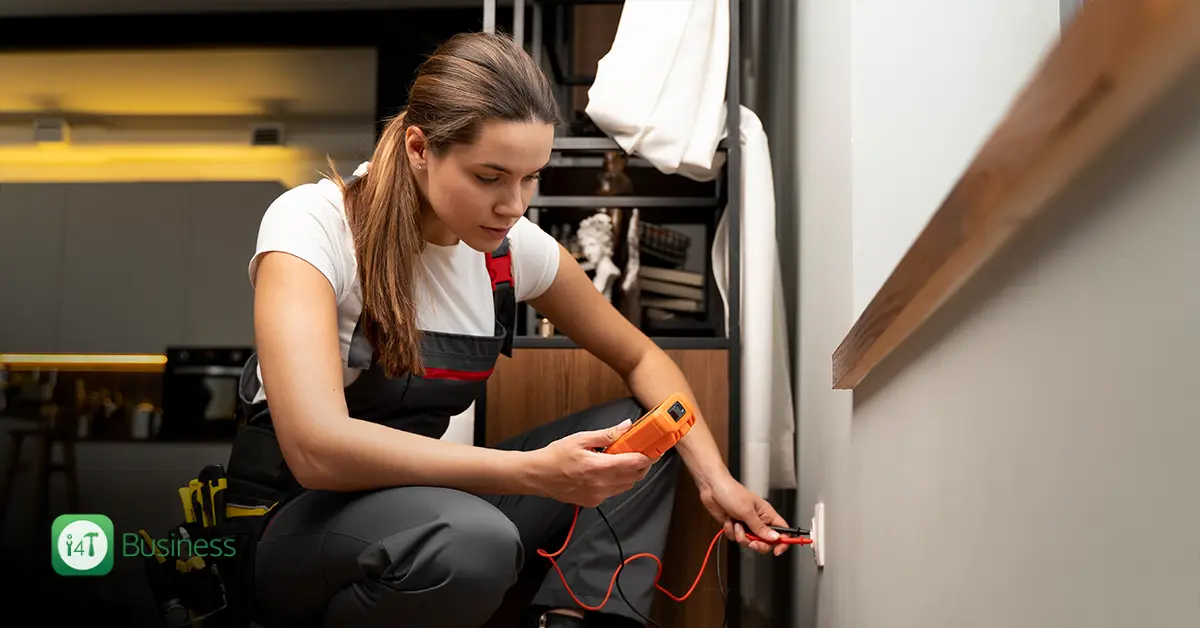How often do you see women as tradies?
While a lot of women in Australia are taking up Tradie careers, women as tradies still make up only 3% of the workforce.
If you are planning to explore a career as a tradie, there is a huge opportunity for you to start your own business and grow. This is because the tradie industry is not limited only to men, and it is not a gender role anymore.
Becoming a tradie is a good way to earn a healthy income. On the other hand, you will have greater job satisfaction since you can become your own boss. In this article, we are going to show you the career paths that women as tradies can take to have a better future. We will also mention the average salaries that these professionals can make. However, please note that these are only rough estimates, and actual values can vary depending on various factors.
Why women should consider a tradie career

Before moving into the career choices that you can take, let’s look at why you should consider becoming a tradie. Choosing a career in trades can be a really smart decision, especially for women looking for a reliable and rewarding job. Here’s why:
- Job Security: Trade jobs are often in high demand, which means there are many opportunities. People always need electricians, plumbers, and other tradespeople, so these jobs are not going away anytime soon.
- Good Earnings: Jobs in trades can pay really well. The more experience and skills you gain, the more money you can make. On the other hand, if you decide to start your own business, you can earn more, but you need to have good business skills.
- Be Your Own Boss: Many tradespeople end up starting their own businesses. Therefore, you can work for yourself, set your own hours, and choose which jobs to take.
- Sense of Accomplishment: There’s a real sense of pride in trade work because you can see the results of your hard work. It doesn’t matter whether you helped around the house, painted a room, or fixed a car, it feels great to look at something and say, “I did that.”
- Starting Fresh: For women who want to switch careers or are just starting, trades offer a fresh start. There’s a lot of support for training, and once qualified, you can find work quickly.
1. Electrician
Electricians have to work with the electrical systems at homes, offices, and factories. They are responsible for setting up new electrical systems, fixing problems in old ones, and making sure that the place is safe from electrical hazards.
Electricians earn an average of about AUD 100,000 per year in Australia. With more experience, if they specialise in areas like commercial electrical work or become consultants, they can earn more. Electricians can also progress to supervisory roles, start their businesses, or teach others in trade schools.
However, you should develop some skills and get certain certifications to practice as an electrician in Australia. Let’s look at them one by one:
- Skills: You need to know how electrical systems work and how to handle wiring, circuits, and electrical panels safely. Electricians need to figure out what’s wrong with electrical systems and know how to fix them. This requires good thinking and problem-solving abilities.
- Certifications: In Australia, you first need to complete an apprenticeship. The duration of the apprenticeship can vary depending on your local area and its regulations. After that, you can apply for a license through the regulatory authority in your state.
- Licensing: In every Australian state and territory, electricians must hold a valid electrical license to legally carry out electrical work. This is regulated by state and territory electrical licensing boards. This is required to work legally as an electrician.
2. Plumber

Plumbers don’t just work to fix a leaky faucet; they are experts at unblocking drains and fitting and waterproofing bathrooms in homes, offices, etc. They install new plumbing systems, fix problems in existing ones, and ensure that everything operates smoothly and safely.
In Australia, plumbers earn an average of about AUD 80,000 per year. Experienced plumbers who specialise in areas like gas fitting or steam fitting can earn more. Plumbers can move up to become site supervisors, start their own plumbing businesses, or teach in vocational schools.
However, you’ll need several skills and specific certifications to work as a plumber. Let’s look at them one by one:
- Technical Skills: Knowledge of water and sewage systems, as well as the ability to install and repair these systems, are crucial. Plumbers often need to diagnose issues that are not immediately obvious and come up with effective solutions quickly.
- Certifications: To legally work as a plumber in Australia, you must complete an apprenticeship and obtain a vocational training certificate, such as a Certificate III in Plumbing. After finishing your training, you need to get a plumbing license from the local licensing authority in your state.
- Licensing: In Australia, you need to obtain a license to perform plumbing work legally in any state or territory. This licensing ensures that plumbers have the required set of skills and knowledge necessary to perform plumbing tasks safely and competently.
3. Carpenter
Did you know that in Australia, carpenters typically earn an average salary of around AUD 70,000 per year? Yes, carpenters with specialised skills in areas like cabinet making or fine woodworking can even earn more. When you gain knowledge and experience working as a carpenter, you can shift to a project management position. On the other hand, you can start your own carpentry business or teach carpentry skills in trade schools.
However, to become a carpenter, you’ll need to develop several important skills and obtain certain certificates.
- Technical Skills: You should understand how to work with different types of wood, tools, and construction methods.
- Creativity: Carpenters often need to think creatively to design and execute their projects, especially when customising pieces to fit specific spaces or purposes.
- Physical Fitness: Carpentry can be physically demanding, involving lifting heavy materials and standing for long periods.
- Certifications: In Australia, you typically need to complete an apprenticeship in carpentry, which lasts 3 to 4 years. After finishing your apprenticeship, you should obtain a Certificate III in carpentry through a registered training organisation to work independently.
- Licensing: This requirement can vary from one state to another. In South Australia and Northern Territory, there is strict licensing for general carpentry. However, in other states, it is a legal requirement to get a license from a regulatory authority.
4. Automotive Mechanic
Automotive mechanics maintain and repair vehicles so that they run safely and efficiently. They work on engines, brakes, transmissions, electrical systems, etc., diagnosing problems and fixing them. These mechanics also perform routine maintenance like oil changes and tire rotations.
In Australia, automotive mechanics make an average salary of about AUD 75,000 per year. However, those who specialise in certain types of vehicles or repair work can earn more.
If you are planning to become an automotive mechanic, you’ll need a mix of technical, analytical, and customer service skills.
- Technical Skills: Understanding vehicle systems—such as engines, electrical systems, and emissions controls—is crucial. Mechanics must be able to use diagnostic tools to identify issues and determine the best way to fix them.
- Technological Proficiency: Modern vehicles are equipped with advanced technology. Therefore, mechanics must have skills to handle electronic diagnostics and software used in automotive systems.
- Certification: Mechanics in Australia typically need to complete an apprenticeship and a Certificate III in Light Vehicle Mechanical Technology or a similar qualification. This training combines practical work with study so that they are well-prepared for the job.
- Licensing: In Australia, general automotive mechanics do not usually need a specific state-issued license to perform most standard mechanical work. However, some exceptions require a license to do specific tasks such as air conditioning work, electrical repairs, or any work that involves handling refrigerants.
5. Landscape Gardener

Landscape gardeners will design gardens, choose the right plants, and look after them by watering, pruning, and fertilising. They also build features like paths and ponds and make sure plants and trees will stay healthy and the garden looks good.
In Australia, landscape gardeners make an average salary of about AUD 55,000 to AUD 75,000 per year. This depends on various factors like experience, location, and the type of projects they work on.
If you want to be a gardener, you should have the following qualities and qualifications:
- Qualifications: Many landscape gardeners have a certificate or diploma in horticulture or landscape design from a technical college. Some might start with an apprenticeship.
- Creativity: A good sense of design and creativity helps in creating visually appealing gardens.
- Physical Fitness: The job can be physically demanding, with a lot of bending, lifting, and using tools.
- Love of Nature: Enjoying working outdoors and having a passion for plants is crucial.
- Licensing: In Australia, the licensing requirements for landscape gardeners vary by state and the specific type of work they perform. For example, in some states, landscape gardeners engage in structural landscaping. These are projects like building retaining walls, paving, or installing permanent fixtures, which may need a builder’s or landscaper’s license.
States like Queensland, New South Wales, and Victoria have strict licensing requirements. Therefore, it is always better to check with local authorities in your area.
6. HVAC Technician
This is another profession that women as tradies can follow. They work on heating, ventilation, air conditioning, and refrigeration systems that control the temperature and air quality in buildings.
HVAC technicians typically earn between AUD 90,000 to AUD 105,000 per year in Australia, depending on their experience and the complexity of their work. However, if you want to be an HVAC technician, you should have the following qualifications and licenses.
- Education and certification: Technicians should start with a course from a technical school that teaches them about HVAC systems. They should obtain the Certificate III in Air-conditioning and Refrigeration. Further, they should also go through apprenticeships, working with experienced technicians to gain practical skills.
- Licensing: In Australia, to work with refrigerants, HVAC technicians need a Refrigerant Handling License (RHL) from the Australian Refrigeration Council. On the other hand, there are local licenses that you should obtain depending on your state and the type of work you do. This is stringent in Queensland, New South Wales, and Victoria.
7. Construction Manager
A construction manager is responsible for overseeing construction projects from start to finish. They will make sure that everything goes according to plan, from managing the budget and schedule to ensuring that the project meets safety standards.
In Australia, construction managers typically earn between AUD 185,000 and AUD 205,000 per year. This depends on various factors like their experience and the complexity of their projects. However, becoming a construction manager is not easy. Being a woman as a tradie, if you want to start a career as a construction manager, you should have the following qualifications.
- Education: Construction managers should at least have a diploma or bachelor’s degree in construction management, civil engineering, or a related field.
- Master of Management: Construction managers should handle various things at the same time to make sure that the project flows as planned. Therefore, they should be experts in financial management, supply chain management, etc.
- Experience: They should gain experience in construction roles by working as an assistant manager or supervisor. This is crucial before taking on a managerial position.
8. Painter and Decorator

They are the experts in matching colours, applying the paint, and making sure that the painted surface has an excellent finish. It’s a job that combines art and practical skills to make buildings look their best.
Painters in Australia can make around AUD 75,000 per year. However, they need good hand-eye coordination and the ability to use various tools and materials. On the other hand, they should have the following skills and qualifications.
- Knowledge of Materials: It is important to learn about different types of paints, wallpapers, and finishes. Further, they should learn how each of them interacts with different surfaces.
- Education and Training: You don’t need a formal degree to start this career. However, it is better to get a Certificate III in Painting and Decorating through a recognised organisation. You can start your career by getting an apprenticeship and building your portfolio for a couple of years.
- Licensing: In Australia, painters and decorators typically do not need a specific license to perform basic painting and decorating work in most states. However, some exceptions and additional considerations depend on the type of work and location. So, it is better to check with the local authorities in your area.
9. Welders
There is a good demand for skilled welders in Australia, especially in industries that rely on metal structures and machinery like construction. Welders in Australia can typically earn between AUD 75,000 and AUD 85,000 per year.
If you are planning to become a welder, then you should have the following skills and qualifications.
- Techniques: Welders should learn various welding techniques like arc welding, MIG (Metal Inert Gas) welding, and TIG (Tungsten Inert Gas) welding, etc.
- Technical Training: You should start your trade through technical training programs offered at vocational schools or community colleges. These programs teach the different welding techniques and the types of metals used.
- Apprenticeships: Many welders also complete apprenticeships, which provide hands-on experience under the guidance of experienced welders.
- Safety Certifications: Safety is crucial in welding due to the risks involved with handling hot metals and intense light. Welders need specific safety training through courses to use protective gear like helmets and gloves and handle emergencies.
- Certifications: There are no specific certifications that are mandatory for welders in Australia. However, if you can obtain a certificate from a recognised body like the Australian Welding Institute, you can improve your credibility.
10. Roofing Specialist
Becoming a roofing specialist can be a rewarding career for women as tradies, especially if you enjoy working outdoors and are interested in construction. You would need good balance and should not be afraid of heights as you would be required to often work high up.
On the other hand, roofing specialists should pay attention to detail to ensure that every part of the roof is perfectly aligned and secure. Roofing specialists in Australia can expect to earn between AUD 70,000 and AUD 80,000 a year.
If you want to become a roofing specialist in Australia, you should obtain specific certifications and skills.
- Vocational Training: They must start vocational training and get a Certificate III in Roof Tiling or a Certificate III in Roof Plumbing from a recognised organisation. Then, follow an apprenticeship to get on-the-job training and classroom learning.
- Licensing: It is mandatory to get a license in almost every state if you are planning to become a roofing specialist. However, there are certain exceptions in Tasmania, Northern Territory, and the Australian Capital Territory. So check with your local authority for more information.
Wrapping up
As you can see, there are various paths for women as tradies. There are special careers that give higher pay. However, this high pay comes with more risk and responsibility.
You should have special skills, certifications, and licenses if you want to become a tradie. This will vary depending on the profession you choose, your location, and the nature of your work. So make sure to get a rough idea from the information we have shared and do your research to get further details.
As you can see, becoming a tradie can be rewarding. However, handling a business by yourself can be difficult. That’s why you should invest in a good job management software. It helps you handle your schedule, communicate with your clients, track your tools, generate invoices, maintain files, etc.
If you want software that has all these features, make sure to try i4T Business. We have served the Australian tradie industry for many years, and we know that we can help you to be more efficient. Don’t just take our word for it; try our free trial and experience it yourself.
Being a woman as a tradie has more potential than you think. Start on the right foot and you are on your way to success!
FAQs
Electricians, plumbers, and construction managers often have higher earnings, especially with experience and additional certifications.
By gaining solid technical training, specialising in areas like electric vehicles, and building strong problem-solving skills.
- Wear the right safety gear.
- Join support networks or groups like Women in Trades.
- Continue learning to keep your skills updated.
- Maintain a positive attitude.
- Don’t be afraid to ask for help when needed.
Yes, the demand is growing as clients increasingly value diverse perspectives and detailed work.
Women can work as roofers, and they are increasingly doing so as the industry encourages more female participation.
Hot off the press!

Field Service Management sector operates, the i4TGlobal Team loves to share industry insights to help streamline your business processes and generate new leads. We are driven by innovation and are passionate about delivering solutions that are transparent, compliant, efficient and safe for all stakeholders and across all touch points.









